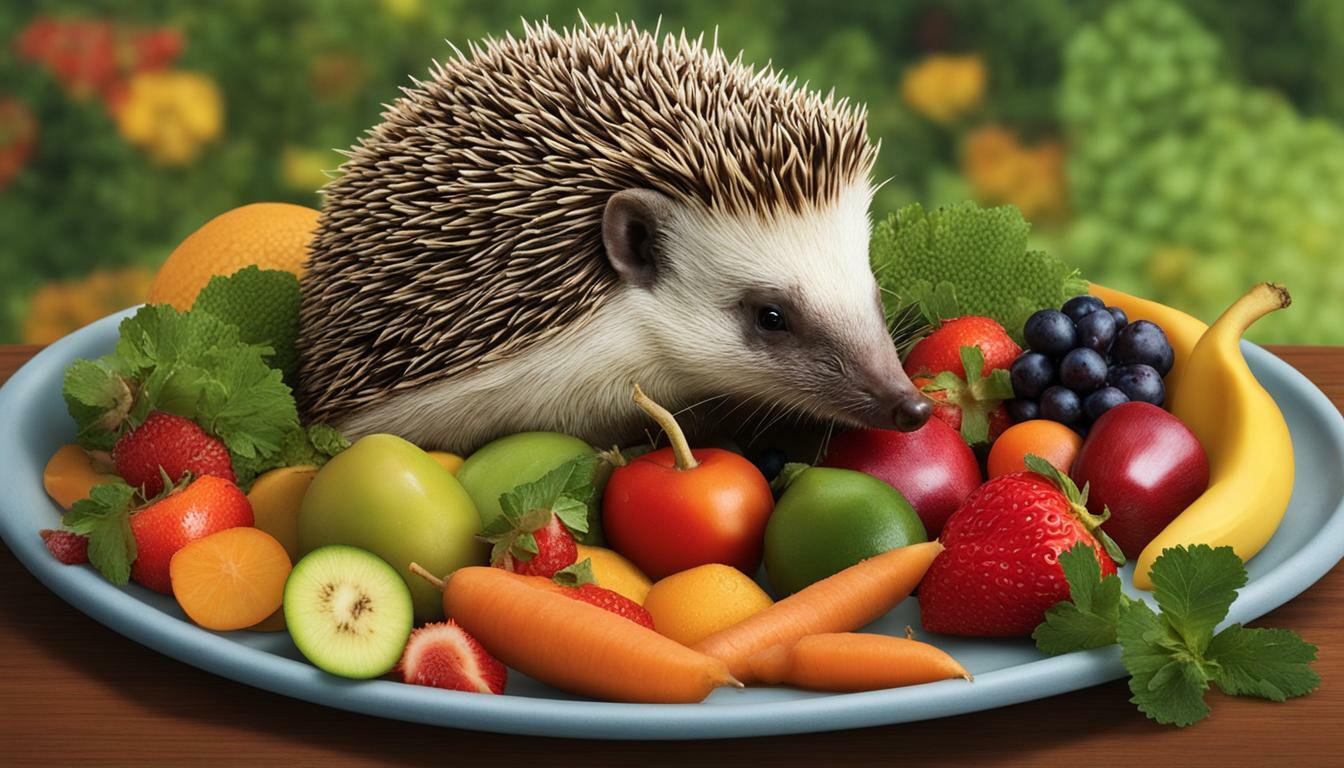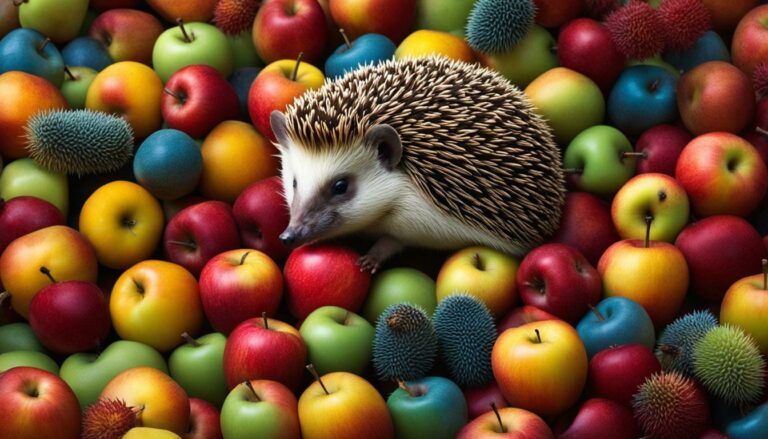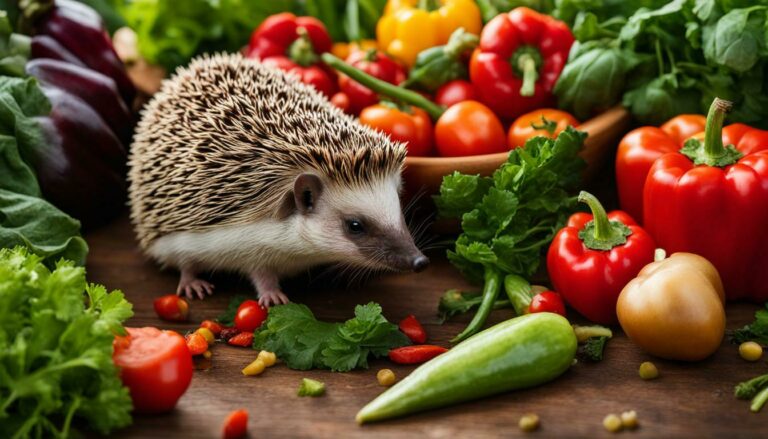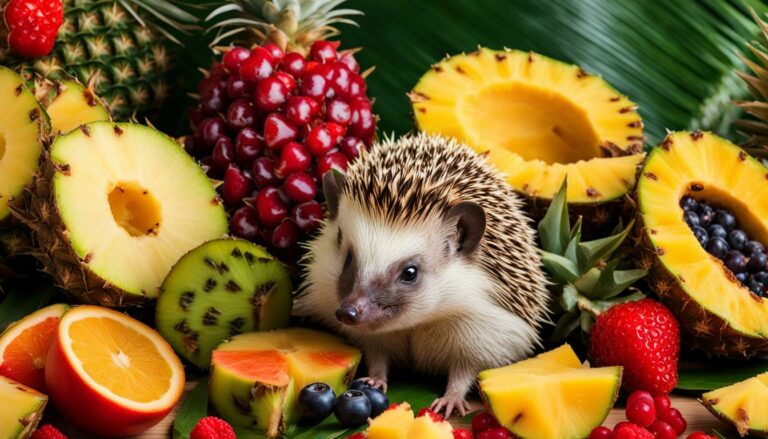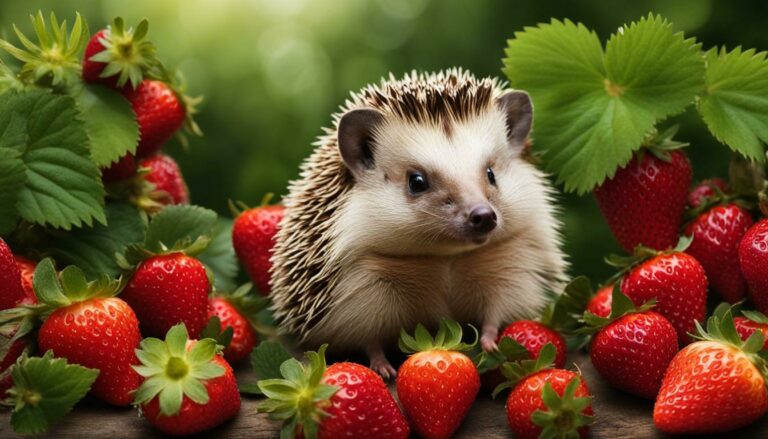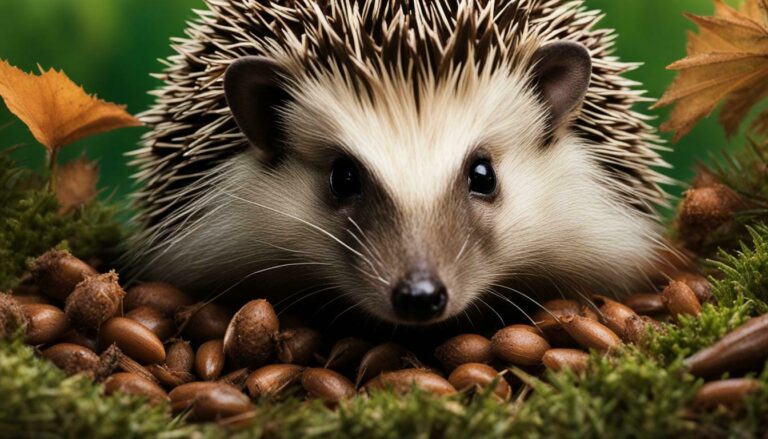Can Hedgehogs Eat Earthworms? Get the Facts Here.
Hedgehogs are known for their unique diet, but can they safely consume earthworms? In this comprehensive guide, we will explore the facts and considerations regarding hedgehogs and their ability to eat earthworms.
Key Takeaways:
- Earthworms are a popular food choice for many animals due to their nutritional value.
- Not all worms are safe for hedgehogs to eat, as some can contain harmful pesticides and parasites.
- Earthworms are safe for hedgehogs to eat and are actually a staple part of their diet.
- Feeding earthworms to hedgehogs can provide additional nutritional benefits.
- It is important to know the difference between edible worms and those that should be avoided.
Is It Safe For Hedgehogs To Eat Earthworms?
Before incorporating earthworms into a hedgehog’s diet, it is crucial to understand the safety implications. While hedgehogs are known to be insectivores and can consume a variety of bugs and worms, not all worms are safe for them to eat. It is important to distinguish between the worms that provide necessary nutrients and those that may be harmful to hedgehogs’ health and development.
Some worms, such as nematodes, larvae, and flatworms, contain pesticides and can have adverse effects on hedgehogs when consumed. These worms can easily be ingested by hedgehogs while foraging for food, leading to potential health problems. Therefore, it is essential to avoid feeding hedgehogs worms that may carry harmful substances.
However, earthworms are generally safe for hedgehogs to eat. They are a staple part of a hedgehog’s diet in the wild, along with other insects and critters. Hedgehogs are nocturnal animals, just like earthworms, which makes them an ideal prey item. From April to October, when hedgehogs are active and not in hibernation, they will consume earthworms whenever they come across them.
For domesticated hedgehogs, earthworms can be purchased from bait and pet retail stores and fed as part of their regular diet. It is also worth dedicating a section of your garden where hedgehogs can forage for insects on their own. Recent studies suggest that hedgehogs only use food in gardens as a supplement to their natural diet, providing an additional nutritional value.
While hedgehogs can enjoy earthworms, it is important to avoid feeding them mealworms. Mealworms can be hard to digest and cause health problems when consumed in large quantities. Dried mealworms, in particular, have little to no nutritional value and should be avoided.
If you decide to buy earthworms from a retail store, they are usually comfortable in the container they come in, as long as it’s kept at a cool temperature. However, if you want to keep earthworms as a long-term food source, investing in a worm keeper is recommended. This way, you can feed them different types of foods and ensure a steady supply of nutritious earthworms for your hedgehog.
In summary, hedgehogs can safely eat earthworms as part of their diet. Earthworms are a natural and nutritious food source for hedgehogs and can be purchased from bait and pet retail stores. Avoid feeding hedgehogs worms that may contain harmful substances or are difficult to digest. By incorporating earthworms into their diet, you can provide hedgehogs with additional nutritional benefits and support their overall health.
How To Feed Earthworms To Hedgehogs
Proper feeding techniques are essential when offering earthworms to hedgehogs. While earthworms are a great source of nutrients and can be a staple part of their diet, there are a few things to keep in mind to ensure the health and safety of your hedgehog.
1. Source: When feeding earthworms to your hedgehog, it is important to ensure that they come from a safe and reliable source. Avoid using worms from your yard or unknown sources, as they may have come into contact with pesticides or other harmful substances. It is best to purchase earthworms from reputable pet or bait stores.
2. Preparation: Before feeding earthworms to your hedgehog, make sure to wash them thoroughly with clean water to remove any dirt or debris. You can also cut them into smaller pieces to make it easier for your hedgehog to consume. However, some hedgehogs may enjoy the challenge of eating a whole worm, so consider your hedgehog’s preferences.
3. Feeding: Offer the earthworms to your hedgehog in a shallow dish or on a feeding platform. Some hedgehogs may be hesitant at first, so it may take some time for them to get used to the taste and texture of the worms. You can try enticing them by placing a small piece of earthworm on their nose or lips to stimulate their appetite.
4. Quantity: It is important to feed earthworms to your hedgehog in moderation. While they can be a nutritious addition to their diet, too many earthworms can cause digestive upset. Start by offering a small amount and observe how your hedgehog responds. If they show signs of diarrhea or bloating, reduce the amount or frequency of earthworms in their diet.
5. Monitoring: After feeding earthworms to your hedgehog, keep an eye on their overall health and stool consistency. If you notice any changes or abnormalities, consult with a veterinarian experienced in hedgehog care to rule out any underlying health issues.
Table: Can Hedgehogs Eat Earthworms?
| Types of Worms | Feeding Suitability |
|---|---|
| Earthworms | Safe and nutritious for hedgehogs. Can be a staple part of their diet. |
| Mealworms | Avoid feeding mealworms in large quantities as they can be hard to digest and cause health problems. |
| Superworms | Can be provided in moderation, but avoid excessive amounts due to their high fat content. |
By following these best practices, you can safely incorporate earthworms into your hedgehog’s diet and provide them with a nutritious treat. Remember to monitor your hedgehog’s overall health and adjust their diet as needed to ensure their well-being.
What About Other Worms?
Earthworms are not the only type of worm that hedgehogs can eat, but it is important to be aware of other options and any potential risks they may pose. While earthworms are a safe and staple part of a hedgehog’s diet, there are other worms that can also be suitable for feeding hedgehogs.
One popular choice is mealworms. These insects are commonly found in pet stores and can be a good source of protein for hedgehogs. However, it is important to avoid feeding mealworms in large quantities, as they can be hard to digest and may cause health problems for hedgehogs.
Another option is wax worms. These worms are high in fat and should be provided sparingly as an occasional treat rather than a regular part of a hedgehog’s diet.
It is important to note that not all types of worms are safe for hedgehogs to consume. For example, certain insects like spiders, ants, and centipedes should never be fed to hedgehogs as they can be toxic and potentially harmful. Additionally, it is crucial to avoid feeding hedgehogs any worms that have come in contact with pesticides or parasites.
| Safe Worms for Hedgehogs | Worms to Avoid Feeding Hedgehogs |
|---|---|
| Crickets | Spiders |
| Mealworms | Ants |
| Wax Worms (in moderation) | Mosquitoes |
| Grasshoppers | Centipedes |
| Snails | Millipedes |
It is always best to purchase worms from reputable sources, such as pet stores or bait shops, to ensure they are safe and free from any potential risks. Additionally, if you are unsure about the suitability of a particular worm for your hedgehog, it is recommended to consult with a veterinarian who specializes in exotic pets.
How To Keep Earthworms
If you want a sustainable supply of earthworms for your hedgehog, consider keeping them yourself. This not only ensures a constant source of food but also allows you to control the quality and nutritional value of the worms. Here are some tips on how to keep earthworms:
- Choose the right container: Use a plastic tub or container with a lid to house your earthworms. Make sure the container has good ventilation holes and is large enough to accommodate the number of worms you plan to keep.
- Create a suitable bedding: Fill the container with bedding material such as shredded newspaper, coconut coir, or peat moss. This provides a comfortable environment for the worms and helps maintain moisture.
- Provide food: Earthworms feed on organic matter, so you can add kitchen scraps such as fruit and vegetable peels, coffee grounds, and crushed eggshells to the container. Avoid adding meat, dairy, or oily food as they can attract pests.
- Maintain the right conditions: Keep the bedding moist but not too wet. Monitor the temperature to ensure it stays between 55°F and 75°F (13°C and 24°C), as extreme temperatures can be harmful to the worms.
- Harvest the worms: When you need to feed your hedgehog, gently dig into the bedding and collect the earthworms. Avoid using chemicals or pesticides in the container as they can harm the worms and potentially be harmful to your hedgehog.
By following these steps, you can establish a sustainable supply of earthworms for your hedgehog’s diet. Remember to always monitor the condition of the worms and provide a clean and suitable environment for their well-being. Additionally, it’s important to consult with a veterinarian or an expert in hedgehog care to ensure you are meeting your pet’s dietary needs properly.
Table:
| Container | Bedding | Food | Conditions | Harvesting |
|---|---|---|---|---|
| Plastic tub with lid | Newspaper, coconut coir, or peat moss | Fruit and vegetable scraps, coffee grounds, crushed eggshells | Moist but not too wet, temperature between 55°F and 75°F | Dig into bedding to collect earthworms |
Keeping earthworms for your hedgehog’s food can be a rewarding and sustainable practice. Not only does it provide a natural and nutritious food source, but it also allows you to be more involved in your pet’s dietary needs. With proper care and attention, you can ensure a steady supply of earthworms to keep your hedgehog happy and healthy.
Benefits of Feeding Earthworms to Hedgehogs
Earthworms offer several nutritional benefits that can contribute to a hedgehog’s overall health and well-being. While they may not be the most glamorous creature, earthworms are a natural food source that hedgehogs have been consuming for centuries. Here are some of the key advantages of including earthworms in a hedgehog’s diet:
- High in Protein: Earthworms are rich in protein, which is essential for a hedgehog’s growth, muscle development, and overall body function. Protein provides the necessary amino acids for a healthy metabolism and helps support the immune system.
- Low in Fat: Unlike some other insects or worms, earthworms are relatively low in fat content. This makes them a suitable food choice for hedgehogs that may need to watch their weight or have dietary restrictions.
- Natural Source of Nutrients: Earthworms are packed with vitamins and minerals that are vital for a hedgehog’s well-being. They contain calcium, iron, magnesium, and other essential nutrients that contribute to bone health, blood circulation, and overall vitality.
In addition to these nutritional benefits, earthworms also provide hedgehogs with mental stimulation and an opportunity to exhibit their natural foraging behavior. The act of hunting for earthworms can be an enriching activity that keeps hedgehogs physically active and mentally engaged.
However, it’s important to note that not all hedgehogs may readily accept earthworms as part of their diet. Some hedgehogs may not find them appealing or may have individual preferences when it comes to food. It’s always best to observe your hedgehog’s reactions and consult with a veterinarian if you have any concerns or questions about their diet.
Table: Nutritional Content of Earthworms
| Nutrient | Amount per 100g |
|---|---|
| Protein | 10.2g |
| Fat | 1.6g |
| Calcium | 10mg |
| Iron | 0.3mg |
| Magnesium | 24mg |
Remember to always provide fresh and clean earthworms to your hedgehog, ensuring they are sourced from reputable sources that maintain safe and hygienic conditions. It’s also important to offer a varied diet to hedgehogs, including other insects and appropriate commercial hedgehog foods, to ensure a balanced nutritional intake.
Conclusion
In conclusion, earthworms can be a valuable addition to a hedgehog’s diet, providing essential nutrients and serving as a healthy treat option. While not all worms are safe for hedgehogs to eat, earthworms are a safe and natural choice. They are easily accessible, often found in gardens and can also be purchased from bait and pet retail stores.
For domesticated hedgehogs, incorporating earthworms into their diet can provide additional nutritional benefits. It’s important to note that earthworms should not be the sole source of food for a hedgehog, but rather a supplement to their natural diet. Providing earthworms as a treat or an occasional snack can help ensure that your hedgehog receives a well-rounded and balanced diet.
It is recommended to avoid feeding hedgehogs mealworms, as they can be difficult to digest and may cause health problems when consumed in large quantities. Other types of worms, such as super worms, wax worms, horn worms, and even maggots, can be fed to hedgehogs in moderation, as they contain healthy nutrients for their diet.
If you decide to feed your hedgehog earthworms, it is important to ensure that they are sourced from a reputable supplier. In addition, proper care should be taken to keep earthworms in a suitable environment, such as a worm keeper or composting system, to ensure their freshness and nutritional value.
By incorporating earthworms into a hedgehog’s diet, owners can provide their pets with a natural and nutritious treat option. Earthworms not only offer essential nutrients, but also stimulate a hedgehog’s natural foraging instincts. So, if you’re considering adding variety to your hedgehog’s diet, earthworms can be a great choice!
FAQ
Q: Can hedgehogs eat earthworms?
A: Yes, hedgehogs can safely eat earthworms. Earthworms are a staple part of a hedgehog’s diet and provide valuable nutrients.
Q: Is it safe for hedgehogs to eat earthworms?
A: Yes, it is safe for hedgehogs to eat earthworms. However, it is important to avoid feeding hedgehogs other types of worms, such as nematodes, larvae, and flatworms, as they may contain pesticides and harmful substances.
Q: How should I feed earthworms to hedgehogs?
A: You can feed earthworms to hedgehogs either by purchasing them from bait and pet retail stores or by allowing your hedgehog to snuffle for insects in a designated area of your garden. Earthworms can be fed to hedgehogs as a regular part of their diet.
Q: Are there any other worms that hedgehogs can eat?
A: Yes, hedgehogs can eat other types of worms, such as mealworms, super worms, wax worms, and horn worms. However, they should avoid mealworms in large quantities as they can cause digestive issues.
Q: How can I keep earthworms for hedgehog food?
A: If you want to keep earthworms as a long-term food source for hedgehogs, you can invest in a large worm keeper. Earthworms can be fed various foods, including green kitchen waste, mashed potatoes, and oatmeal in small quantities.
Q: What are the benefits of feeding earthworms to hedgehogs?
A: Earthworms are a natural and healthy food source for hedgehogs. They provide essential nutrients and can be a valuable supplement to their diet. Feeding hedgehogs earthworms can help them thrive and maintain good health.
Q: In conclusion, are earthworms a good food choice for hedgehogs?
A: Yes, earthworms are a popular and safe food choice for hedgehogs. They are commonly found in their natural environment and offer nutritional benefits. However, it is important to avoid feeding hedgehogs mealworms in large quantities as they can cause health problems.
